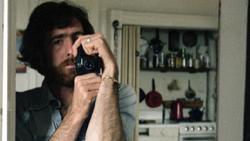A&E
McElwee brings “Photographic Memory” to Hamilton College
By Briget Braley ’18
May 1, 2015
When the filmmaker Ross McElwee stood up after his screening of Photographic Memory (2011), I could hardly believe my eyes and ears—Ross is real! His visit was a part of the F.I.L.M. (Forum on Image and Language in Motion) Series, which brings a variety of filmmakers and artists to Hamilton throughout the year, all of which are curated by Professor of Film Scott MacDonald. McElwee is a filmmaker who essentially founded the genre of personal documentary. His most famous film, Sherman’s March (1986), has won many awards and was selected to be archived in the U.S. National Film Registry.
McElwee presented his film Photographic Memory, which concerns his relationship with his son, Adrian, and his journey to France to understand his memories of his early adulthood. McElwee frequently struggles with his increasing disconnect from Adrian as the boy grows older and becomes more immersed in a technological world that McElwee barely understands. Throughout the film, McElwee shows simultaneous respect and frustration for his son’s use of technology, as he shows both Adrian’s own films and the wall Adrian creates with his laptop. As Ross travels to France, he searches for the first man who employed him as a wedding photographer and the woman he fell in love with in St. Quay-Portrieux.
As he struggles to remember his own thoughts in his early twenties, McElwee confronts fundamental issues of memory and aging. His interest in the disconnect between photograph and memory is highlighted as he reconnects with his old lover, Maud, and discovers two different versions of their time together. As he said in the question and answer session following the film, “The whole journey of the film is temps perdu.”
During this session, Ross openly answered students’ and community members’ eloquent questions about his film and shared his wisdom about filmmaking. As the genre of personal documentary is unique, McElwee spent time talking about the difficulties of experiencing life and documenting life simultaneously. He spoke about the increasing difficulty he faced in forcing himself to film around the people he cares about as he has became older and began to build a family. It was also interesting to hear about his interest in the varying levels of people’s self-consciousness around the camera, as he finds someone’s tentativeness in front of the camera equally interesting as someone who performs in front of the camera. A significant portion of the audience was very well-acquainted with most of his films, so that many of the questions focused on the themes contained in his body of work as a whole, which lead to fascinating and in-depth responses about his filmmaking methods and narrative perspectives.
This coming Sunday, James Benning, a premier avant-garde filmmaker, will be visiting F.I.L.M. with his screening of Two Cabins. It will take place at 2 p.m. in KJ Auditorium. The performance is sure to be a fun and interesting show that.





